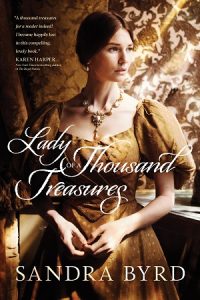Sandra Byrd is the author of 50 books, including a number of historical novels. Among her accolades for her work are the Historical Novel Society’s Editor’s Choice award, two Christy Award nominations, Library Journal Best Book selections, and inclusion on Booklist’s Top Ten Inspirational Books of the Year list. Her latest novel is Lady of a Thousand Treasures (Tyndale House), the first book in her Victorian Ladies series. In this interview, the author shares about the book’s time and setting, what attracts her to write about the Victorian era, and how her faith impacts her storytelling…
Sandra, what can you share with us about the time and setting of Lady of a Thousand Treasures?
 I’m a proud American but also have long admired the English and their history. England is the mothership for our language. British written historical records are so meticulously kept and go back so many centuries. They’re treasure troves for a history lover.
I’m a proud American but also have long admired the English and their history. England is the mothership for our language. British written historical records are so meticulously kept and go back so many centuries. They’re treasure troves for a history lover.
The Victorian era is far enough back that it feels like a completely different time from ours, but not so far back that it’s unrelatable. When I write, I enjoy writing books set both in the city and the countryside.
A recent walk down a London street turned into a discovery of a portion of a wall built in the Roman era. And then—those houses! I love those old stately homes in England, with their secret rooms and corridors, the back stairs and the front stairs, the creaking hallways and the walls hung chock-a-block with pictures.
I enjoyed researching and writing about Venice, too. I think it’s a place we don’t often travel in fiction.
What inspired you to set the book where/when you did?
The elements of a good Victorian—a mysterious hero of whom we are not quite sure till the end, a heroine without parental support so she must stand on her own, the commingling of dark and light—all make for a compelling read. It doesn’t hurt that it was such a long reign — lots of decades’ worth of good material to discover.
My husband and I are devoted fans of British television and film. We are especially partial to the early seasons of Jeeves and Wooster. In one episode, the older men are after one another’s silver collections, stooping to all manner of shenanigans to acquire them. Wodehouse uses humor, as always—the lowly silver cow creamer!—to wryly remark on an upper-class habit, the collecting of things and envy of others’ possessions.
I knew I wanted to write a book on collections, because it’s very British, and it’s also something with which all of us can identify. We are all collectors, even of pennies or figurines and such, if not artwork.
I have always appreciated the V & A (Victoria and Albert Museum) just for its sheer size. And I enjoyed learning a wee bit about its predecessor, the South Kensington, and how some private collections came to partially populate museums. It’s interesting to note that museums, as such, are a relatively modern construct, isn’t it?
What about Miss Eleanor Sheffield made you want to tell her story?
Ellie had many difficulties thrust upon her, and yet did not allow herself to become a victim. Victorian women had major constraints, and the heroines in my books cannot just solve their problems as you or I might—but I love them the more for that; they are forced to cleverly use the tools at hand.
Truthfully, all of us, then and now, are constrained in some way from the full self-determination we would prefer, and perhaps that is one way we identify with them. And yet—the human spirit, a strong woman’s spirit, faces those challenges head-on, tries to think through what she wants, and then plots a way toward it.
When roadblocks occur, she finds a way over, around, or through. That was true a thousand years ago, and it is still true, now.
Also—we must all be risk-takers to gain what we want: love, respect, a meaningful life, and personal fulfillment. Today’s readers certainly have that in common with yesterday’s women, my historical heroines.
Ellie had to learn to do all of that and to trust herself. When she did, life unfolded for her!
What are your favorite things about writing historical fiction?
 I love to travel to many places, but I also love to travel to many times, eras out of reach for a visit except through literature and film. I choose to write historical novels because, through them, we can time-and-place travel together.
I love to travel to many places, but I also love to travel to many times, eras out of reach for a visit except through literature and film. I choose to write historical novels because, through them, we can time-and-place travel together.
As an author, I work hard to ensure that my heroines are actually of the era, so I don’t allow one to take on a role for which I can’t find an actual Victorian woman to emulate in some capacity.
I wanted Eleanor to be a curator and collector, to be an appraiser, to be good in her field. To ensure that she is not anachronistic, I first had to make sure there was such a woman in Victorian England. There was! Lady Charlotte Schreiber.
Lady Charlotte was an amazing woman in her own right. As such, she made an excellent friend and mentor to my Ellie. You can see some of Lady Charlotte’s donations to the V & A and the British Museum, online.
Dante Rosetti was well known as both a man who enjoyed curiosities—a very Victorian pastime—and an artist in many mediums. He made a perfect addition to my book. I seek cameos, or even more substantive roles, by people who were not only of the time but organic to my book.
Weaving real people in and among my fictional characters is one of my favorite things about writing historical fiction because I believe it sets my readers right in the middle of the time and place, as it happened.
How does your faith impact how you approach storytelling?
In my own faith life, I’ve had the benefit of a “long walk in the same direction,” to paraphrase the inimitable Eugene Peterson, and that walk has included breathtakingly beautiful experiences as well as plenty of skinned knees and dark nights of the soul (St. John of the Cross). I draw insight from both.
Friends and readers have shared their insights with me along the way, too, and their honesty bolsters me in my dry times, or even times of despair and God’s seeming silence.
Fiction is not the place to teach or preach, but it’s an amazing format to explore the inner workings of an individual’s heart. God promises never to leave us or forsake us, and He reminds us He’s a very present help in times of trouble.
However, God is not a helicopter parent. He lets us work things out because He trusts us, and we are adults. I like exploring that in my novels.
Visit Sandra Byrd’s author page here:
https://www.familyfiction.com/authors/sandra-byrd
Lady of a Thousand Treasures
Sandra Byrd
Tyndale House
Discover more about Sandra Byrd’s books here:
https://www.familyfiction.com/authors/sandra-byrd/books


